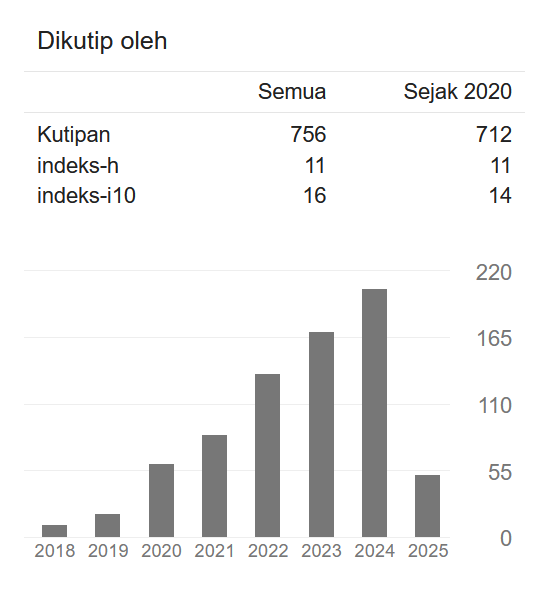Islamic Mindfulness to Enhance Self-Regulation and Academic Success in Generation Z
DOI:
https://doi.org/10.19109/medinate.v21i2.28012Keywords:
Academic Performance, Educational, Generation Z, Islamic Education,, Islamic Mindfulness, Self-RegulationAbstract
The rapid advancement of digital technologies has significantly impacted Generation Z, particularly in relation to self-regulation and academic performance. This generation faces challenges in managing stress, attention, and emotions, often exacerbated by the overuse of social media and digital devices. The aim of this study was to explore the potential of Islamic mindfulness, incorporating practices such as dhikr and tafakur, in improving self-regulation and academic performance among high school students in Indonesia. This quasi-experimental research utilized a pretest-posttest control group design, involving 300 students from six high schools in Bogor. The experimental group received an 8-week intervention focusing on Islamic mindfulness techniques, while the control group continued their regular academic activities. Self-regulation and academic performance were measured using standardized questionnaires and academic tests before and after the intervention. The results revealed that students in the experimental group showed significant improvements in both self-regulation and academic performance, in contrast to the control group. This study contributes to the field of Islamic education by providing evidence for the effectiveness of Islamic mindfulness in fostering better emotional regulation, focus, and academic outcomes in the digital age. It offers practical solutions for integrating mindfulness into the educational curriculum, supporting the mental well-being and academic success of Generation Z students in Islamic educational settings.
References
Ahmad, W., Wan, M., & Mahmud, M. S. (2021). Implications of Social Media Addiction on Academic Performance among Generation Z Student-athletes during COVID-19 Lockdown. International Journal of Learning, Teaching and Educational Research, 20(8), 194–209.
Agus, A. H., Norman, E., Hamid, N., & Hasanah, U. (2023). Exploring Student Perspectives on Quality Assurance in Independent Curriculum Services within Educational Institutions. Al-Tanzim: Jurnal Manajemen Pendidikan Islam, 7(3), 763-778.
Darabi, F. (2021). The Effectiveness of Mindfulness Training on Self-regulation and Perceived Academic Control of Girl Students. Randwick International of Social Science Journal, 2(2), 128–140. https://doi.org/10.47175/rissj.v2i2.223
Fayda-Kinik, F. S., & Kirisci-Sarikaya, A. (2024). Migration in Education Research: A Synthesis to Support Sustainable Development. In I. Kushnir, K. Sood, M. S.-A. Park, H. Zhong, & N. Serret (Eds.), Education and Sustainable Development in the Context of Crises: International Case Studies of Transformational Change (pp. 73–106). Emerald Publishing Limited. https://doi.org/10.1108/978-1-83797-773-420241006
Firmansyah, R., Norman, E., Romli, M., & Permana, Y. (2023). Urgensi Tafsir Ilmi di Masa Modern: Tanggapan Zaghlul An-Najjar pada Kritikus Tafsir Ilmi di Dalam Kitabnya Tafsir Ayat-ayat Kauniyah Fi Al-Quranil Karim. Reslaj: Religion Education Social Laa Roiba Journal, 5(6), 3632-3648.
Jiang, J. M., Seng, E. K., Zimmerman, M. E., Sliwinski, M., Kim, M., & Lipton, R. B. (2017). Evaluation of the Reliability, Validity, and Predictive Validity of the Subscales of the Perceived Stress Scale in Older Adults. Journal of Alzheimer’s Disease, 59(3), 987–996. https://doi.org/10.3233/JAD-170289
Junco. (2021). The Routledge International. Routledge.
Kartika, I., Norman, E., & Ibad, M. K. (2023). The Influence of Emotional Intelligence and Spiritual Intelligence on Teacher Professionalism at Madrasah Aliyah Attahiriyah Jakarta. History of Medicine, 9(1), 266-276.
Mansor, N. A., Abdullah, N., & Rahman, H. A. (2020). Towards electronic learning features in education 4.0 environment: Literature study. Indonesian Journal of Electrical Engineering and Computer Science, 19(1), 442–450. https://doi.org/10.11591/ijeecs.v19.i1.pp442-450
Mulyadi, L., Shalahudin, M., & Norman, E. (2024). The Role of Stress Management with dhikr-based relaxation techniques in Reducing Teacher Burnout in the Era of Independent Learning Curriculum. At-Tadris: Journal of Islamic Education, 3(2), 42-50.
Norman, E., Paramansyah, A., & Zaini, A. W. (2024). The Influence of Inspiring Leadership and Religiosity on Teacher Performance. Al-Tanzim: Jurnal Manajemen Pendidikan Islam, 8(2), 438-450.
Norman, E., & Pahlawati, E. (2024). Pengembangan kepemimpinan yang adaptif dan fleksibel: Meningkatkan ketahanan organisasi di era transformasi digital. MES Management Journal, 3(1), 298-305.
Norman, E., Paramansyah, A., Damayanthy, D., & Marliani, L. (2024). Applying Predictive Analytics for Resource Allocation in Islamic Educational Organizations: Enhancing Efficiency and Decision-Making through AI. Tadrib: Jurnal Pendidikan Agama Islam, 10(2), 1148-1158.
Rasha, F., Ramalingam, L., Menikdiwela, K., Hernandez, A., Moussa, H., Gollahon, L., Layeequr Rahman, R., & Moustaid-Moussa, N. (2020). Renin angiotensin system inhibition attenuates adipocyte-breast cancer cell interactions. Experimental Cell Research, 394(1), 112114. https://doi.org/https://doi.org/10.1016/j.yexcr.2020.112114
Saraei, M., Newberg, A. B., Hosseini, S. R., Bayati, T., & Batouli, S. A. H. (2023). Comparing the three states of Dhikr, meditation, and thinking about God: an fMRI study. Religion, Brain & Behavior, 13(1), 5–17. https://doi.org/10.1080/2153599X.2022.2108888
Sauer, J., Schmutz, S., Sonderegger, A., & Messerli, N. (2019). Social stress and performance in human-machine interaction: a neglected research field. Ergonomics, 62(11), 1377–1391. https://doi.org/10.1080/00140139.2019.1652353
Sharma, S., & Singh, G. (2024). Exploring consumers’ social media engagement in addressing plastic pollution. Social Responsibility Journal, 20(5), 898–918. https://doi.org/10.1108/SRJ-12-2022-0530
Shetu, S. N., Maisha, K., & Promi, S. I. (2024). The Relationships among Social Stress, Self-Regulation, Addictive Smartphone Use, and Social Media Usage Behaviour of Generation Z. International Journal of Business and Technopreneurship (IJBT), 14(2 SE-Articles), 173–192. https://doi.org/10.58915/ijbt.v14i2.628
Shukor, K. A., Noor, A. F. M., Abidin, M. Z. H. Z., Razak, M. I. A., Hassan, P., & Basir, M. K. A. (2025). To What Extent Religion Drives the Malaysian Marine Students Succeed the Pre-Sea Training? The Role of Religion in Contributing to SDG4 (Quality Education). Journal of Lifestyle and SDGs Review, 5(2 SE-), e02693. https://doi.org/10.47172/2965-730X.SDGsReview.v5.n02.pe02693
Tholkhah, I., Norman, E., & Nadiah, N. (2023). Implementasi Pembelajaran Pendidikan Agama Islam Berbasis Digital pada SD Muhammadiyah Bojonggede Bogor. At-Tadris: Journal of Islamic Education, 2(1), 36-56.








